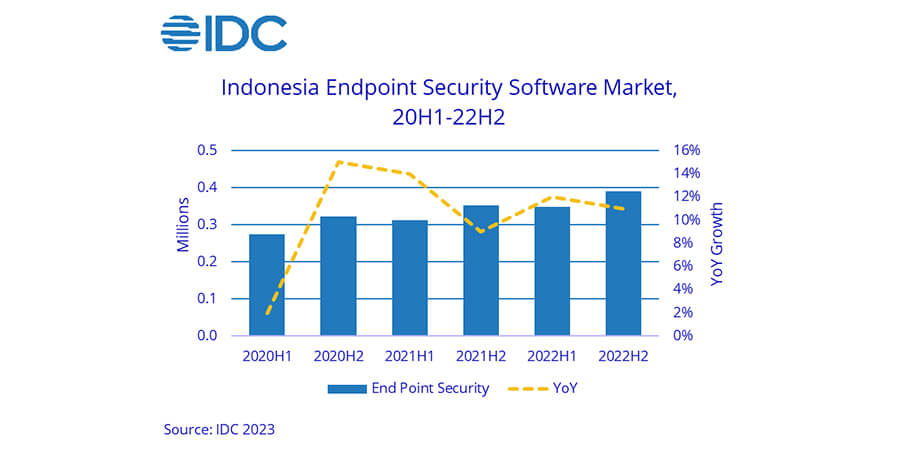According to International Data Corporation's (IDC) Worldwide Semiannual Software Tracker, the endpoint security software market in Indonesia expanded by 10.8% year on year (YoY) in 2H22. This increase in demand for endpoint security solutions can be attributed to growing investments by Indonesian businesses to protect their precious assets at endpoints, which include desktop computers, laptops, mobile devices, servers and other network-connected devices.
"As companies transition to more flexible work arrangements and continue to adopt cloud, mobile and IoT technologies, there is a noticeable increase in companies' awareness of the importance of bolstering endpoint security to address cybersecurity risks to their business. The implementation of endpoint security software that combines preventive measures, endpoint detection & response (EDR), and robust hardening technologies plays a crucial role in mitigating attack attempts," said Sandika Putra, associate market analyst, IDC Indonesia.
Businesses in Indonesia have become increasingly cognizant of the essential need to enhance endpoint security to prevent cybersecurity risks as they migrate to more flexible work arrangements and wider usage of cloud, mobile, and IoT technologies. Endpoint security software that combines preventive measures, endpoint detection and response (EDR), and robust hardening technologies is critical to protecting against potential cyber threats.
The IDC Cybersecurity Outlook 2023 report emphasizes the increasing complexity of infrastructure settings affecting enterprises, owing mostly to the deployment of multi/hybrid cloud operations. Furthermore, the deployment of work-from-home habits has broadened the parameters that businesses must protect, compounding the difficulties associated with managing security across several platforms and environments. According to the report, 22% of Indonesian organizations are concerned about intellectual property loss as a result of more sophisticated cyberattacks.
The endpoint security software market is divided into two segments: consumer digital life protection (CDLP) and corporate endpoint security. CDLP offers comprehensive cybersecurity solutions to secure users' devices, data, and online activities, whereas corporate endpoint security has two main components: modern endpoint security and server security. Modern endpoint security safeguards personal computing devices by detecting harmful programs and behaviors and responding appropriately to threats. Server security is concerned with the protection of physical and cloud servers.
In Indonesia, CDLP accounts for a sizable percentage of the endpoint market. Consumers now have access to built-in or free alternatives that offer similar features, such as antivirus, anti-malware, anti-phishing, and even VPN services; therefore, growth is likely to be in the single digits. Corporate endpoint security, on the other hand, is growing faster thanks to increased adoption of cloud-enabled infrastructure and mobile work practices. In Indonesia, the modern endpoint security market is growing by 17.9% year on year. Server security is also gaining traction in Indonesia, with a year-over-year growth rate of 28.1%.
Various factors influence the importance of corporate endpoint security, such as the adoption of cloud-based digital business processes, which pose new threats that necessitate sophisticated security measures to protect sensitive data and vital operations. Furthermore, Indonesia's position as one of the leading Asia-Pacific spenders on IoT technology emphasizes the importance of improved endpoint security. As the volume and diversity of threats rise, companies confront substantial issues in securing endpoints, prompting the adoption of novel endpoint security methodologies and solutions.
The endpoint security software market is predicted to increase steadily as public awareness of the need for security grows in reaction to recent cybersecurity incidents in Indonesia, including high-profile data breaches affecting several well-known firms. This upward trend will be accelerated by the broad acceptance of remote work techniques and the expanding use of cloud computing.





